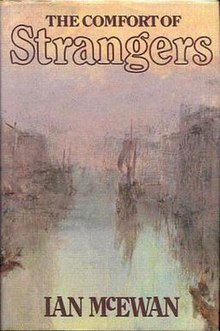
Ian Russell McEwan, is an English novelist and screenwriter. In 2008, The Times featured him on its list of "The 50 greatest British writers since 1945" and The Daily Telegraph ranked him number 19 in its list of the "100 most powerful people in British culture".

Amsterdam is a 1998 novel by British writer Ian McEwan, for which he was awarded the 1998 Booker Prize.
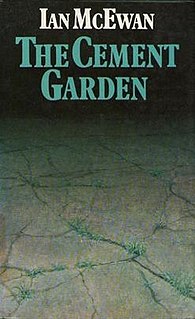
The Cement Garden is a 1978 novel by Ian McEwan. It was adapted into a 1993 film of the same name by Andrew Birkin, starring Charlotte Gainsbourg and Andrew Robertson. The Cement Garden has had a positive reception since its original publication.

First Love, Last Rites is a collection of short stories by Ian McEwan. It was first published in 1975 by Jonathan Cape, with cover designed by Bill Botten, and re-issued in 1997 by Vintage.
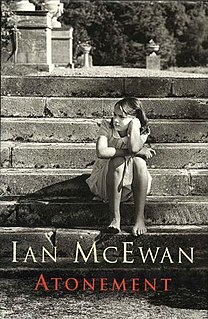
Atonement is a 2001 British metafictional novel written by Ian McEwan. Set in three time periods, 1935 England, Second World War England and France, and present-day England, it covers an upper-class girl's half-innocent mistake that ruins lives, her adulthood in the shadow of that mistake, and a reflection on the nature of writing.

Ordeal by Innocence is a work of detective fiction by British writer Agatha Christie, first published in the UK by the Collins Crime Club on 3 November 1958 and in the US by Dodd, Mead and Company the following year. The UK edition retailed at twelve shillings and sixpence (12/6) and the US edition at $2.95.

The Comfort of Strangers is a 1990 psychological thriller film directed by Paul Schrader, and starring Christopher Walken, Rupert Everett, Natasha Richardson, and Helen Mirren. The screenplay by Harold Pinter was adapted from the 1981 novel of the same name by Ian McEwan.
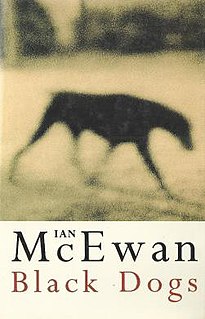
Black Dogs is a 1992 novel by the British author Ian McEwan. It concerns the aftermath of the Nazi era in Europe, and how the fall of the Berlin Wall in the late 1980s affected those who once saw Communism as a way forward for society. The main characters travel to France, where they encounter disturbing residues of Nazism still at large in the French countryside. Critical reception was polarized.

In Between the Sheets (1978) is the second collection of short stories by British writer Ian McEwan.

The Child in Time (1987) is a novel by Ian McEwan. The story concerns Stephen, an author of children's books, and his wife, two years after the kidnapping of their three-year-old daughter Kate.

The Innocent is a 1990 novel by British writer Ian McEwan. It received positive reviews from book critics and is often considered one of his best novels.

Enduring Love (1997) is a novel by British writer Ian McEwan. The plot concerns two strangers who become perilously entangled after witnessing a deadly accident.

On Chesil Beach is a 2007 novella by the British writer Ian McEwan. It was selected for the 2007 Booker Prize shortlist.
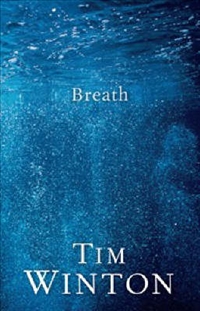
Breath is the twentieth book and eighth novel by Australian author Tim Winton. His first novel in seven years, it was published in 2008, in Australia, New Zealand, the UK, the US, Canada, the Netherlands and Germany.

Imperial Bedrooms is a novel by American author Bret Easton Ellis. Released on June 15, 2010, it is the sequel to Less than Zero, Ellis' 1985 bestselling literary debut, which was shortly followed by a film adaptation in 1987. Imperial Bedrooms revisits Less than Zero's self-destructive and disillusioned youths as they approach middle-age in the present day. Like Ellis' earlier novel, which took its name from Elvis Costello's 1977 song of the same name, Imperial Bedrooms is named after Costello's 1982 album.

The Little Stranger is a 2009 gothic novel written by Sarah Waters. It is a ghost story set in a dilapidated mansion in Warwickshire, England in the 1940s. Departing from her earlier themes of lesbian and gay fiction, Waters' fifth novel features a male narrator, a country doctor who makes friends with an old gentry family of declining fortunes who own a very old estate that is crumbling around them. The stress of reconciling the state of their finances with the familial responsibility of keeping the estate coincides with perplexing events which may or may not be of supernatural origin, culminating in tragedy.

Sweet Tooth is a novel by the English writer Ian McEwan, published on 21 August 2012. It deals with the experiences of its protagonist, Serena Frome, during the early 1970s. After graduating from Cambridge she is recruited by MI5, and becomes involved in a covert program to combat communism by infiltrating the intellectual world. When she becomes romantically involved with her mark, complications ensue.
Eileen Battersby was the chief literary critic of The Irish Times. She sometimes divided opinion, having been described by John Banville as "the finest fiction critic we have", while attracting the ire of Eugene McCabe after she gave Dermot Healy an unfavourable review in 2011. Her first novel, Teethmarks on My Tongue, was published by Dalkey Archive Press in 2016.

Nutshell is the 14th novel by English author and screenwriter Ian McEwan published in 2016. It retells William Shakespeare's play Hamlet from the point of view of an unborn child, and is set in 2015.
Julian Gloag is an English novelist and screenwriter. He is the author of eleven novels, the best known of which is his first, Our Mother’s House (1963), which was made into a film of the same name starring Dirk Bogarde.
